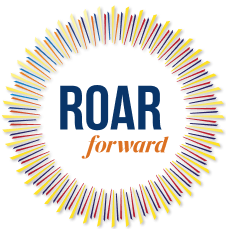Charitable giving undergirds a central tenet of American Democracy. First Amendment protections for freedom of speech and association give basis to the notion that government has limits and people and the institutions they create also help write the nation’s destiny. Through nonprofit organizations and public support of them we put the collective above ourselves and sustain hope for a better future. When we give to organizations, we are joining forces with others who want better communities and a better nation.
Naturally then, American generosity is unparalleled. In 2020 individuals gave $326 billion to charity. Giving cuts across all demographics but people 50 and over contribute a whopping 70% of all individual donations to charitable organizations. In our ROAR Mastermind Group, we have learned the vital and unheralded role people aged 50 and over play in our nation’s economic prosperity, but when it comes to charity these contributions are critical.
Given that such an overwhelming proportion of philanthropy comes from this demographic, it is important to understand how to do it effectively. Getting the most out of your gift could literally change the course of the country. Here are 5 points that you should consider in your philanthropy.
- Have a Vision
A gift to charity should be to further an objective important to the giver. Taking time to answer some key questions will help you narrow down the types of organizations you want to support. Consider what changes you would like to bring about? What causes matter to you? What values would you like to uphold? You should remember that there are more than 1.3 million charitable organizations in the United States with another 70,000 organizations formed every year. It’s impossible to select an organization without knowing what matters most to you.
- Mission and Program Clarity
Once you know what matters most to you, you can then consider the organizations that best accomplish the objectives you have in mind. Remember there are many ways that organizations approach problems or advance causes. An organization that is addressing hunger may choose among several approaches. Feeding people is one way but engaging in advocacy to get more government resources for hungry people or job training so they can earn enough money for their meals are other viable alternatives. Each one of these approaches will have supporters and detractors. What’s important is that you understand what the organization is doing and whether that aligns with your sense of how the problem is best addressed.
- Give Based on Trustworthiness
Once you have mission and program clarity, you can identify the best organizations that do the work. As mentioned, there is no shortage of organizations operating programs consistent with your approach. To narrow the choices, consider first the ones that demonstrate trustworthiness. Granted, this is not an easy job for people who do not work regularly evaluating charity trustworthiness. Fortunately, www.give.org the organization I lead has thousands of free reports on charities, evaluated against 20 rigorous standards for charity accountability. These standards cover governance practices, fiscal management, mission effectiveness, communications, and fundraising practices. An organization that meets these standards has demonstrated trustworthiness.
- Get Close
Once you have narrowed the organizations to a select few and determined that they are trustworthy, you may wish to seek out key staff or volunteers to have questions answered and to have them tell you why they deserve your support. Be sure to ask what is not working well and areas the organization is seeking to improve. Your questions may also come from a review of its website or other due diligence feedback you get from friends or colleagues. There is nothing better than a conversation to bring you an intimate understanding of the organization. If you can, meet in person or by video call. This is a step many donors ignore, but it can be valuable in helping you make your final decisions about where to lend your support.
- Stick with It.
After you’ve done your homework, plan to be a long-term supporter of the organization. It’s not easy for charities to find new donors and keep existing ones. Understand that it’s unlikely that the organization will achieve all its goals but expect it will be making its best efforts given the challenge of its mission. In future appeals you receive from the charity, look for bold, thoughtful ideas that are inspiring and that make sense. Also, consider other ways to help in addition to making a financial gift like volunteering.

